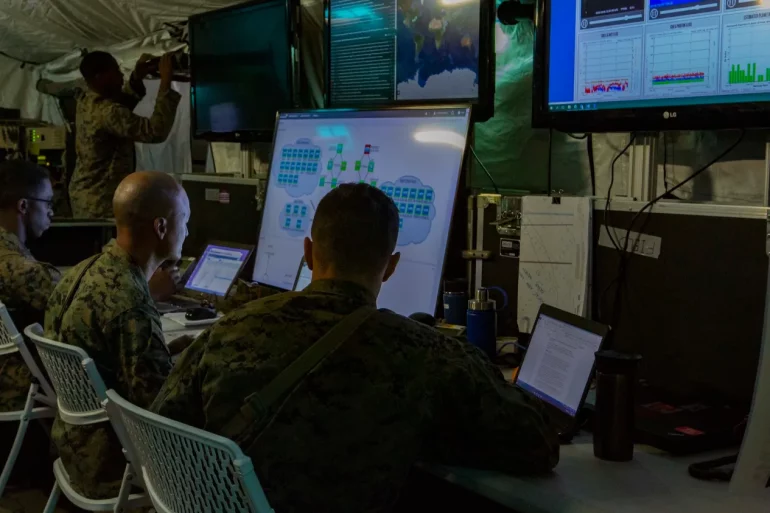- The Department of the Air Force and MIT are including the Marine Corps in their AI accelerator program.
- Two Marines have been selected to join the upcoming cohort of “Phantoms.”
- Over five months, the Marines will engage in advanced research and produce a “publishable impact paper.”
- Lt. Gen. Matthew Glavy emphasizes the AI initiative as an opportunity to showcase the Marines’ innovative capabilities.
- The AI accelerator aims to advance military AI research and support both the Department of the Air Force and civilian sectors.
- The integration of Marines reflects a broader Pentagon commitment to AI as a key element of the Combined Joint All-Domain Command and Control (CJADC2) framework.
- Air Force Col. Garry Floyd notes that the inclusion of Marines will enhance the program’s diverse experiences and capabilities.
- The announcement aligns with the Marine Corps’ new AI strategy, which addresses challenges in technology alignment, competency gaps, and scaling capabilities.
- The strategy highlights the need for upskilling and talent management to close skill gaps and transform the Marine Corps workforce.
Main AI News:
The Department of the Air Force (DAF) and the Massachusetts Institute of Technology (MIT) are significantly broadening their AI accelerator initiative by including the Marine Corps, as announced this Tuesday. This expansion marks a notable shift from the program’s previous focus exclusively on airmen and guardians.
In this new phase of the program, two Marine Corps members have been selected to join the upcoming cohort of “Phantoms.” Over the next five months, these Marines will immerse themselves in cutting-edge research within the AI accelerator, with the expectation of producing a “publishable impact paper” detailing their findings. This initiative underscores the Marines’ ongoing tradition of innovation, as articulated by Lt. Gen. Matthew Glavy, deputy commandant for information. He highlighted that AI presents a fresh opportunity for Marines to demonstrate their ability to integrate technology, people, and processes effectively, enhancing their contributions across various operational domains.
Lt. Gen. Glavy expressed optimism about the collaboration, stating, “Partnering with MIT and the DAF AI Accelerator provides an opportunity to rapidly upskill our Marines to support the Marine Corps’ acceleration of AI adoption, ultimately leading to increased decision advantage for commanders at all echelons.” This partnership is viewed as a critical component in advancing the Marine Corps’ technological capabilities and ensuring that their strategic edge is maintained.
The AI accelerator was originally established to foster military-related AI research and enable the rapid prototyping and scaling of algorithms. Its objective is to benefit both the Department of the Air Force and civilian sectors by enhancing operational efficiency and technological prowess. This move aligns with broader Pentagon priorities, where AI is seen as a vital enabler of the Combined Joint All-Domain Command and Control (CJADC2) framework. This framework is designed to integrate various military domains and improve overall warfighting effectiveness.
Air Force Col. Garry Floyd, director of the AI accelerator, emphasized the value of incorporating Marine perspectives into the program. “Marines bring a unique perspective to military operations, a perspective that can only enrich the AIA’s own diversity of experience,” he noted. Col. Floyd believes that the diverse backgrounds and experiences of the Marines will foster synergies and lead to the development of impactful capabilities for military operations.
The inclusion of Marines in the AI accelerator comes shortly after the Marine Corps unveiled its new AI strategy. This strategy highlights the potential applications of AI across both warfighting and business functions, while also acknowledging the challenges that need to be addressed. These challenges include aligning technology with mission objectives, overcoming competency gaps, and deploying capabilities at scale. Additionally, the strategy addresses the need for robust governance frameworks and fostering collaboration to overcome barriers to innovation.
A key focus of the Marine Corps’ AI strategy is upskilling and talent management. The strategy outlines the urgent need to address current skill and knowledge deficiencies while planning and executing long-term workforce transformation. The document stresses the importance of enhancing service members’ expertise in building, supporting, and sustaining AI systems and emphasizes the need for comprehensive training and education throughout the Marine Corps.
Conclusion:
The inclusion of the Marine Corps in the DAF-MIT AI Accelerator program signifies a strategic enhancement in military AI research and development. By integrating Marines into this high-profile initiative, the program is poised to benefit from their unique operational perspectives and innovative approaches. This move underscores the Pentagon’s commitment to leveraging AI for superior decision-making and operational effectiveness. The broader adoption of AI within the military is likely to drive advancements in both technology and strategic capabilities, positioning the U.S. military at the forefront of modern warfare and technology integration.

